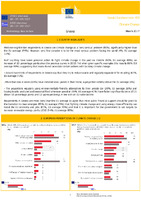| dc.description.abstract | Well over eight in ten respondents in Greece see climate change as a ‘very serious’ problem (85%), significantly higher thanthe EU average (74%). However, very few consider it to be the most serious problem facing the world (4%, EU average12%).Half say they have taken personal action to fight climate change in the past six months (50%, EU average 49%), anincrease of 10 percentage points since the previous survey in 2015. Yet when given specific examples this rises to 86% (EUaverage 90%), suggesting that many do not associate certain actions with tackling climate change.• Around two-thirds of respondents in Greece say that they try to reduce waste and regularly separate it for recycling (67%,EU average 71%).• More than one in seven (14%) have installed solar panels in their home, a proportion notably above the EU average (4%).• The proportions regularly using environmentally-friendly alternatives to their private car (20%, EU average 26%) andbuying locally produced and seasonal food whenever possible (35%, EU average 41%) have fallen significantly since 2015(down 13 percentage points and 12 pp respectively), in line with an EU-wide decline.Respondents in Greece are more likely than the EU average to agree that more public financial support should be given tothe transition to clean energies (89%, EU average 79%), that fighting climate change and using energy more efficiently canboost the EU economy and jobs (87%, EU average 79%) and that it is important for the government to set targets toincrease renewable energy use by 2030 (94%, EU average 89%). |

